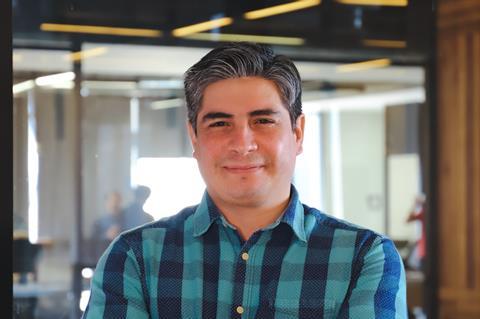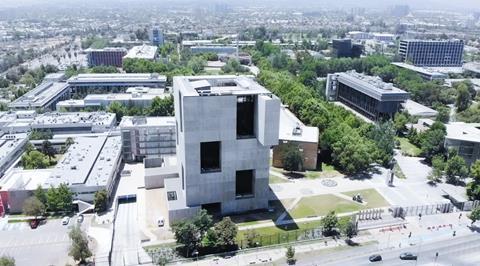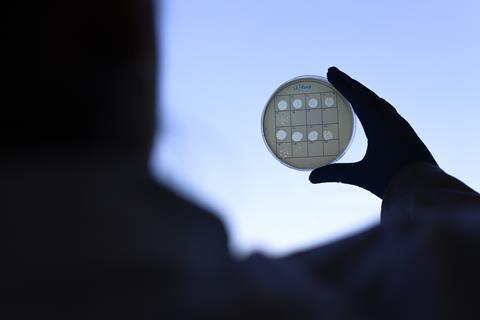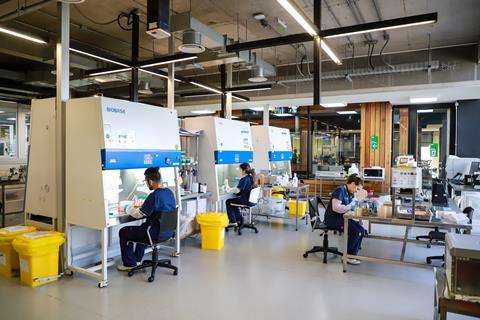Nicolás Cifuentes is Head of Research Projects and Phages at PhageLab, Chile, which offers tailor-made solutions to control bacterial outbreaks in the livestock and poultry industries.
I have been curious about nature and living things since my early childhood. When I was in 8th grade, my parents gave me a toy microscope as a present. It was my favorite toy and I was always trying to observe things like ants and bugs through it.

At the end of high school I knew I wanted to follow a scientific career, so I started my undergraduate studies in Biochemistry in the Universidad de Santiago de Chile in 1999. In this period, I became passionate about virology.
In 2005 I started my PhD studies in Biotechnology, and my thesis was focused on structural aspects of the assembly of Hantaviruses. Subsequently I did two postdoctoral specializations in Chile and the US, studying the cellular and molecular aspects of entry and assembly of respiratory viruses, including influenza, human metapneumovirus, respiratory syncytial virus and paramyxoviruses, among others.
Chaotic time
I came back to Chile in 2019, to start my own laboratory of virology as a professor. My return was chaotic as it coincided with the COVID-19 pandemic, but as a virologist I supported in every possible aspect the authorities in my country. In 2021, shortly after I started as a Professor, I received a call from the CEO of PhageLab to offer me a position, as he needed a virologist. Since then I have been working at PhageLab and I could not say I regret the change.
PhageLab partners with poultry and livestock producers to develop tailor-made antibacterial solutions. Our solutions involve an initial molecular diagnostic of the bacterial problem and then the development of bacteriophage cocktails to target the problem.

For example, one of our phage cocktails, named INSPEKTOR, targets Salmonella spp, one of the most prevalent pathogens in poultry, for which antibiotics cannot be used. Our product helps to restrict the growth of Salmonella curvisa in the intestine of chickens, improving the health of the animals and therefore their commercial value. Another of our products, named FÓRMIDA, targets avian pathogenic Escherichia coli (APEC). In this case, the product helps to reduce symptoms of colibacillosis, which usually leads to mortality and huge economic losses for poultry producers.
Product development
I am the Head of Research Projects & Phages. This is basically the I+D area, which is behind the development of the new solutions that the company offers.
Our area is involved in every aspect of new product developments including: a) the isolation of bacteriophages from environmental samples; b) mixing the appropriate phages to maximize the lytic efficacy against a panel of bacteria, and c) the formulation of the phages with excipients and stabilizers that maximize stability of the final product. At the same time, we also provide solutions for other areas inside the company.
At this point in my career, most of my job is at the desk. My typical day starts with a strong black coffee to help me reading and keeping updated with the scientific literature. After that I try to catch up with all unanswered emails, and then I will have meetings with the principal scientists of my team, to discuss the relevant findings and the next steps in our experiments.

I also try to set up meetings to speak with all the relevant people in the company from other areas, which will help me elucidate what the next big steps of the company are. I will always find a good excuse to go to the laboratory to discuss results (I am very anxious about new data), to speak with the scientists of my team and to share their insights. On less typical days, we have visits from potential investors so we have to guide them through the lab and explain (briefly) what we do and why our job is important.
Millions of chickens
As a person who spent many years associated with academia doing basic science, all my research was always conducted in vitro, with a minor amount of experiments performed ex vivo in organoid models and in vivo in mice.
In PhageLab, one of the most exciting moments for me was when our bacteriophage cocktail INSPEKTOR started to be applied in the farms, in millions of chickens. My team and I did our best job to develop a highly efficient cocktail against Salmonella, but all our data was obtained in vitro, so for us the efficiency of the cocktail in vivo was still a mystery.
Fortunately, the cocktail we developed worked very efficiently in the field, and we were day by day checking the microbiological results coming from the different farms. Some colleagues from field trials told us that some farmers even called INSPEKTOR “the miraculous thing for salmonella”.
Surreal visit
From time to time we receive important visitors in the lab, who are potential investors in PhageLab. In 2023 we received an important delegation from the US that included Reed Jobs, the son of Steve Jobs. The whole visit was surreal, as it seemed like an operation of the FBI, black SUVs included.
I did my research to understand what kind of investments Reed Jobs was doing, so I had to do extra preparation for such a visit. He turned out to be very welcoming during the visit, and seemed interested in our histories about bacteriophages and Phagelab.
Constant challenge
What do I love about my work? Two things: the challenging environment and my team. We are constantly being challenged with new tasks, new bacterial targets, new ideas, new clients, and we always have to answer, and answer fast. The team we have built is the right mix of experience and youth, and it is highly cooperative and passionate about what we do.

It is only because of my team that we can always find the best answers to every challenge. We are aware that the use of bacteriophages as a biotechnological product is still in its infancy, and many times we as a team feel like the new tools, developments, protocols and problems that we have sorted will shape the future of phage therapy.
We have to expand our horizons. Right now our products for Salmonella and E.coli are approved and being used in one of the largest producers of poultry in the world, Brazil. However, we need to expand the company to other countries and continents.
In doing so, one of the main challenges for us is to understand how bacterial populations from the same species, but from different geographic origins, behave against our product. Depending on that, we will have to modify/update the products according to specific needs of producers from different countries.
Additionally, we will have to expand our horizons to other pathogens that affect poultry production, like Campylobacter for example.
Topics
- Agriculture
- Applied Microbiology International
- Avian Pathogenic Escherichia coli
- Bacteria
- colibacillosis
- Community
- Food Security
- FÓRMIDA
- Healthy Land
- INSPEKTOR
- Nicolás Cifuentes
- Nine to five
- One Health
- Phage Therapy
- PhageLab
- Regulating and understanding phage therapy
- Salmonella
- The Americas
- Universidad de Santiago de Chile
- Viruses







No comments yet